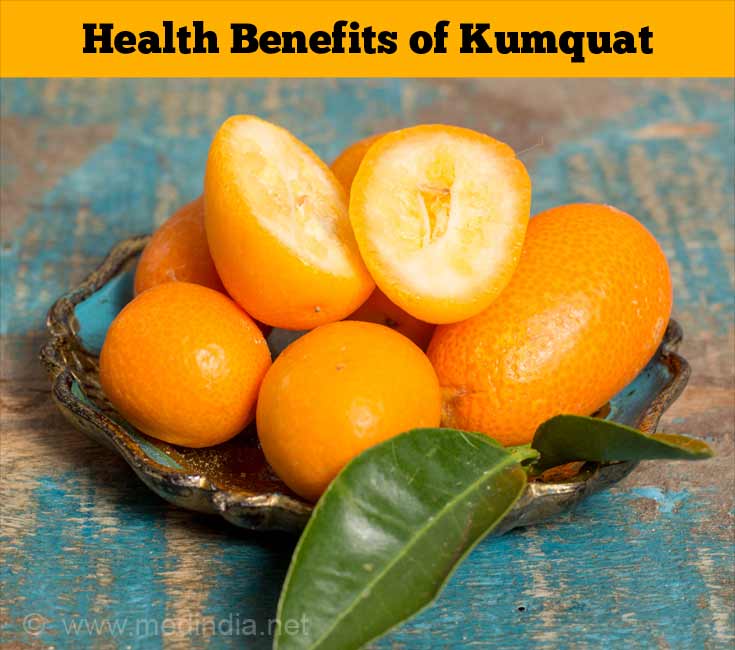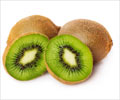- Nutrition Facts: Kumquat - (http://vegonline.org/vegetable-nutrition-facts/nutrition-facts-kumquat)
- Kumquat: Nutrition. Selection. Storage - (http://www.fruitsandveggiesmorematters.org/kumquat)
What is Kumquat?
Kumquats are small orange-like citrus fruits that are native to southeast China. Kumquat trees are like small shrubs, on which hundreds of olive-sized fruits grow. The fruit has a sweet skin and a sour pulp, which can be eaten as whole even with the peel. The sweet and sour flavor of kumquat makes it a preferred choice for jams, jellies, cocktails, preserves, marmalades and desserts. Many liqueurs also contain the kumquat juice extract and certain extracts made from it are used for medicinal purposes.
Kumquats are grown worldwide in different varieties, such as Nagami kumquat, Marumi kumquat, Meiwa kumquat and Hong Kong wild. They are slightly different in shape and taste, but are nutritionally similar.

Health Benefits of Kumquat
Improves Immunity: Kumquats are rich in vitamin C (one fruit consists of 73% of the recommended daily dose) which improves immunity and protects the body from seasonal colds, flu and other microbial infections. Vitamin C primarily leads to growth and development of new cells and is a necessary nutrient to maintain the first line of body defense mechanism.
Aids Digestion: Good amount of fibers along with many other phytonutrients that are present in kumquat help in maintaining the overall digestive health. 10 gm of fiber can be obtained from about 8 kumquats, and that’s just a handful! It helps in curbing gas, constipation, cramps and other digestive anomalies along with providing a large amount of essential nutrients.

Protects from Cancer: High amount of antioxidants, vitamins and flavonoids in kumquat make it an anti-cancer fruit. Presence of carotenes, lutein, tannins and zeaxanthins reduce the risk of cancer as they do not allow cell damage due to free radical oxidation.
Improves Cardiovascular Health: Kumquat lowers cholesterol levels in blood and hence prevents the risk of heart attack or stroke. Its high potassium content increases fluidity in blood and thus maintains blood pressure and heart rate. Omega 3 and 6 also improve overall cardiac health.
Prevents Diabetes: Presence of powerful antioxidants, good amount of fiber, many other phytonutrients and good fats in kumquat can help reduce the risk of developing Type 2 diabetes. Dietary fiber balances the insulin and glucose levels in the body and thus, preventing diabetes.

Stronger Bones: High calcium content in kumquat attributes to stronger and healthier bones. Good amounts of vitamin A ensures strong, healthy bones and aids in their proper development. Calcium deposits help in assuring good bone health, early healing and strong bones and teeth even in older ages.
Boosts Energy: Fruits are generally low in carbohydrate content, but kumquat is an exception. Kumquat is high in carb content and so an excellent source of energy. It replenishes lost energy in workouts or heavy activities. Riboflavin is a vitamin that is important for energy production and its abundance in kumquat makes it easy to produce energy in a simpler way.
Other Benefits:
- Prevents early aging of cells and tissues
- Protects skin from damage
- Enhances vision and reduces cataract risk
- Promotes weight loss
- Promotes early wound healing
- Good for hair and nails

Tips for Usage:
- Eat the fruit, just as it is; yes, with the peel!
- Kumquat chutney can be made by adding ginger, garlic, honey and sugar and stored in the refrigerator for future usage
- Make marmalade and use as spread on bread toast
- They can be frozen and can be stored for months
Kumquat Recipe
Kumquat Pie
Ingredients:
- 1 pie crust
- 1 cup heavy whip cream
- 1 cup condensed milk
- ½ cup kumquat puree
- 1-2 tsp lemon juice
Method:
- In a bowl, mix heavy cream with condensed milk and beat till whipped and thickened
- Add lemon juice and kumquat puree to it and mix well
- Pour the mixture over pie crust in a pie dish
- Refrigerate for 3-4 hours to settle
- Serve chilled









